2014人教版八年级上册英语unit2课件
人教版八年级英语上册第二单元课件

The results for “watch TV” are interesting.
_S_o_m__e students watch TV once or twice a week,
s_tio_m_me_es_
students watch TV __t_h_r_e_e__ _o_r_ _f_o_u_r__ a week, but most students watch _e_v_e_ry_
Do you know?
• sometime 某个时间 • some time 一段时间 • sometimes 有时 • some times 几次
I sometimes go to school by bus. I will go to America sometime this year.
人教版初中英语 八年级上册教学课件
Unit 2 How often do you exercise?
Section A Period 1
Are you healthy?
Do you often drink milk? Do you eat fruit and vegetables everyday? Do you often do your exercise?
人教版八年级英语上册 Unit2 Self Check 优质课件
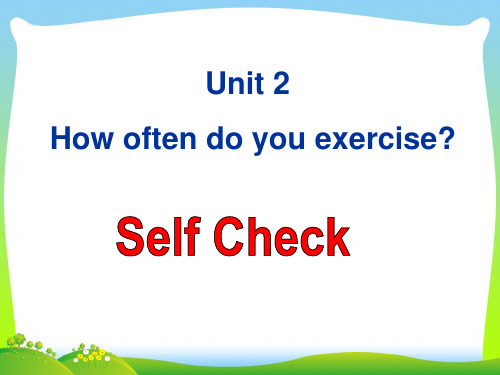
Exercises
I. 单项选择
1. We ___D___ go out to eat but not
very often.
A. usually
B. always
C. never
• 17、儿童是中心,教育的措施便围绕他们而组织起来。2021/7/282021/7/282021/7/282021/7/28
• 2、Our destiny offers not only the cup of despair, but the chalice of opportunity. (Richard Nixon, American President )命运给予我们的不是失望之酒,而是机会之杯。二〇二一年六月十七日2021年6月17日星期四 • 3、Patience is bitter, but its fruit is sweet. (Jean Jacques Rousseau , French thinker)忍耐是痛苦的,但它的果实是甜蜜的。10:516.17.202110:516.17.202110:5110:51:196.17.202110:516.17.2021 • 4、All that you do, do with your might; things done by halves are never done right. ----R.H. Stoddard, American poet做一切事都应尽力而为,半途而废永远不行6.17.20216.17.202110:5110:5110:51:1910:51:19 • 5、You have to believe in yourself. That's the secret of success. ----Charles Chaplin人必须相信自己,这是成功的秘诀。-Thursday, June 17, 2021June 21Thursday, June 17, 20216/17/2021
人教版八年级英语上册Unit 2 Section B (2a-2e)精品课件

• 2%—one to three times a week • 13%—four to six times a week • 85%—every day • Game shows are the most popular.
The best way to relax is through exercise. It's healthy for the mind and the body.
3. Most students use it for fun and not for homework.
What activities do you do in your free time after school?
go camping in the country play computer games
Presentation
2b Read the article and complete the pie charts on the next page.
n Their Free Time?
Last month we asked our students about their free
➢ Task 3 scanning and judging
Read the article and mark True (T) or False (F).
F 1. We found that twenty percent of our students exercise every day.
T 2. Ninety percent of the students use the Internet every day. F 3. Most students use the Internet for homework. F 4. Only twenty percent of the students watch TV two or
人教版初中八年级上册英语《Unit-2-How-often-do-you-exercise》课件
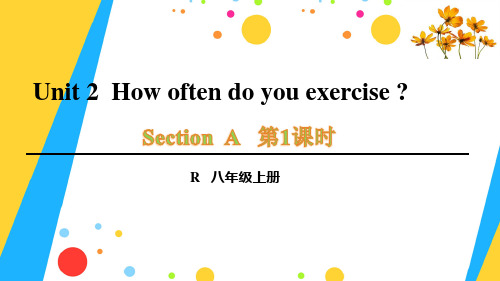
(2)twice a week 意为“一周两次”。在英语中,once表 示“一次”,twice表示“两次”,“三次及以上”要 用“基数词+times”表示。
e.g. three times 三次
中考对接: (山东潍坊中考)——______do you go to Weifang Theatre?
——Once a month.
我有时候玩电脑游戏。
辨析:sometimes, some times, sometime与some time
sometimes:是频度副词,意为“有时”,表示动作 发生的不经常性,多与一般现在时连用,它可位于 句首、句中或句末,对它提问用how often。
some times是名词短语,意为“几次;几倍”, 其中time是可数名词,对它提问用how many times。
twice adv. 两次;两倍 Internet n. (国际)互联网;因特网 Program n. 节目
full adj. 忙的;满的;充满的 swing n. 摆动;秋千 v. (使)摆动;摇摆 swing dance 摇摆舞
Lead-in
What do you usually do on weekends?
A . How soon
B . How often
C . How much
D . How long
2d Role-play the conversation.
Jack: Hi, Claire, are you free next week? Claire: Hmm…next week is quite full for me, Jack. Jack: Really? How come? Claire: I have dance and piano lessons. Jack: what kind of dance are you learning? Claire: Oh, swing dance. It’s fun! I have class once a week,
人教版八年级英语上册课件:Unit 2(共29张PPT)
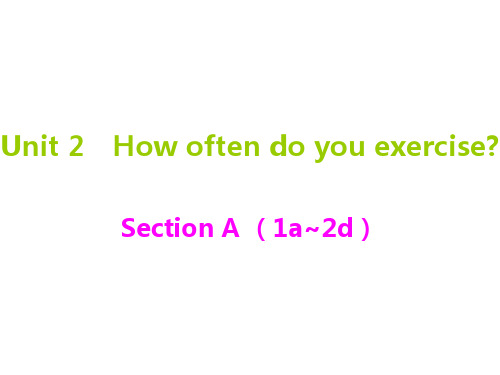
要点梳理
( )2. We need a good night’s sleep because we have got a _____ day tomorrow. A. empty B. hungry C. full D. free ( )3. Don’t _____ the bowl with water because it will spill(溢出). A. fill B. full C. filled D. fills
要点梳理
【应用】 ( )1. Sun Yang _____ every day and he swims very well. A. exercise B. exercises C. do exercise D. does exercises
要点梳理
B
( )2. Tom does eye _____ in the classroom after doing math _____ for half an hour. A. exercises; exercises B. exercise; exercise C. exercises; exercise D. exercise; exercises
【举例】He can hardly speak English. 他几乎不会说英语。 They hardly ever spoke another word. 他们几乎没有再说一句话。 He can hardly understand it, can he? 他几乎不懂,是吗?
要点梳理
课前导学
three times a week
use the Internet
swing dance
have to
你周末通常做什么?
人教版英语八年级上册《 Unit2 Section A 》课件.doc
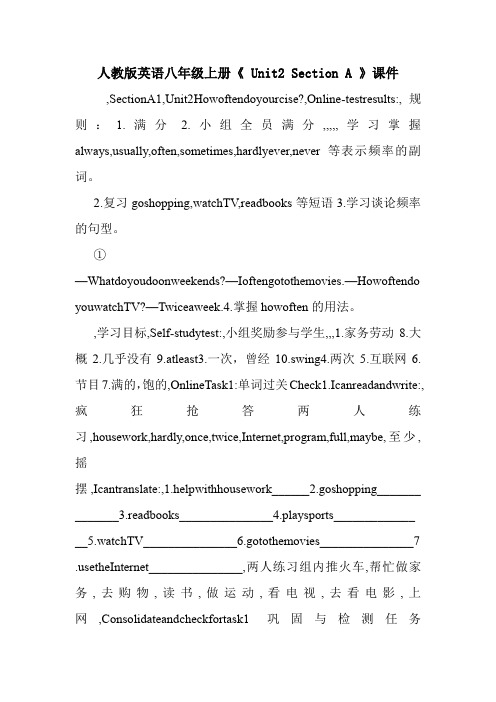
人教版英语八年级上册《 Unit2 Section A 》课件,SectionA1,Unit2Howoftendoyourcise?,Online-testresults:,规则: 1.满分 2.小组全员满分,,,,,学习掌握always,usually,often,sometimes,hardlyever,never等表示频率的副词。
2.复习goshopping,watchTV,readbooks等短语3.学习谈论频率的句型。
①—Whatdoyoudoonweekends?—Ioftengotothemovies.—Howoftendo youwatchTV?—Twiceaweek.4.掌握howoften的用法。
,学习目标,Self-studytest:,小组奖励参与学生,,,1.家务劳动8.大概2.几乎没有9.atleast3.一次,曾经10.swing4.两次5.互联网6.节目7.满的,饱的,OnlineTask1:单词过关Check1.Icanreadandwrite:,疯狂抢答两人练习,housework,hardly,once,twice,Internet,program,full,maybe,至少,摇摆,Icantranslate:,1.helpwithhousework______2.goshopping_______ _______3.readbooks_______________4.playsports_____________ __5.watchTV_______________6.gotothemovies_______________7 .usetheInternet_______________,两人练习组内推火车,帮忙做家务,去购物,读书,做运动,看电视,去看电影,上网,Consolidateandcheckfortask1巩固与检测任务1,Write,1.____________________2.__________3.__________4.__ ________5.__________,helpwithhousework,readabook,rcise,watch TV,goshopping,Lookatthepicture.Makealistoftheweekendactivities.,1 a,OnlineTask2:(微课1)频度副词的用法,小组讨论(3mins)组内推火车回答,频率副词,always意为“总是”,表示动作的重复或状态的延续。
人教版八年级英语上册Unit2全单元课件

conversations about what you do on
weekends. What do you do on weekends?
I usually watch TV.
Do you go shopping?
No, I never go shopping.
What does she do on weekends?
1. To learn to talk about how often you do things with some adverbs of frequency: always/ usually/ often/ sometimes/ hardly ever /never/ twice…
2. To listen for some specific information in conversations
adv. 几乎不 adv. 在任何时候;从来;曾经
5. hardly ever _w_a_t_c_h__T_V____ hardly ever 6. never (0%) _g_o_s_h_o_p_p__in_g__ 几乎从不
听力原文
Reporter: What do you do on weekends? Girl 1: I sometimes go shopping. Boy 1: I never go shopping.I usually watch TV. Boy 2: I always exercise. Girl 2: I often help with housework. Reporter: How about you? Girl 3: I hardly ever watch TV.I always read. Reporter: Oh,why is that? Girl 3: Oh,I don’t know.I guess I just like
人教版八年级英语上册Unit 2 Section B (1a-1e)精品课件

【拓展延伸】
be good at be good to
擅长……
后跟名词、代词或动词-ing作宾 语,同义短语为do well in“在……方面做得好”。
对……友好
相当于be friendly to, 后面一般 接人。
善于应
be good with
付……的; 对……有办
后接sb.或sth.。
法
3. She says it’s good for my health. health n. 健康;人的身体(或精神)状态 health作不可数名词,常用短语: be in good/poor health身体好/差。
A: How often do you exercise? B: I exercise every day. A: And how often do you …?
1. How often do you eat vegetables? 2. How often do you eat fruit? 3. How often do you eat fast food? 4. How often do you exercise? 5. How many hours do you watch TV every week? 6. How many hours do you usually sleep at night?
While-listening
1c Listen to an interview about two people's daily habits. Circle your answer to each question.
Does Tina have good habits? Yes. No. I don't know. Does Bill have good habits? Yes. No. I don't know.
人教版英语八年级上册精-第二单元ppt课件
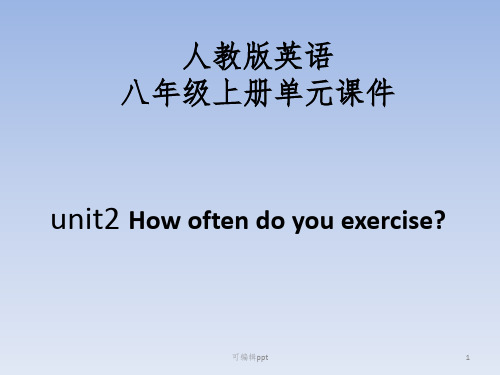
可编辑ppt
4
What do you do on weekends? I often/usually/...
often go shopping
hardly ever
help with housework
可编辑ppt
5
What do you do on weekends? I often/usually/...
hardlyever, never 与疑问词 how often 对应。表示的频率由 always 向 never 递减。
在句中位于实意动词之前,情态动词(can 等)、助动词(do 等)、连系动词(be 等)之后。但 sometimes 也可在句首。
Unit 2 How often do you exercise?
2d. Role-play the conversation.
可编辑ppt
18
1. Claire has piano lessons __t_w_i_c_e__ ( two ) a week.
2. He watches TV ___o_n_c_e__ (one) a week.
3. Katrina _e_x_e_r_c_is_e_s_ ( exercise ) every day.
( 你多久看一次电影?)
( 我大概一个月看一次电影。)
__H_o_w__o_f_te_n__d_o_e_s_h_e_w__a_tc_h__T_V_?____ ( 他多久看一次电视?)
_H_e__h_a_rd_l_y_e_v_e_r_w__a_tc_h_e_s_T_V__. ______ ( 他几乎不看电视。)
often Cheng Tao does them.
可编辑ppt
人教版八年级上册英语 Unit 2 Section B (3a-Self Check) 授课课件

Period5SectionB (3a-SelfCheck)
词汇听写
同学们,上一课学习的单词你们都掌握了吗?现在大 家来检验一下,点击下面的音频开始听写吧!
课文导入
Talkaboutgoodhabits IreadEnglishbookseveryday. Ialwaysexercise.
wonrekvaenrdshe_________goestothedentistforteethcleaning. Shesayssheisafraid! ④
课文呈现
Activities How often? Good habits Bad habits
课文呈现
3c. Writeareportaboutyourgoodandbadhabits. Sayhowoftenyoudothings. Usethereportin3aasanexample.
考点精讲
④Shesayssheisafraid!
考点4 afraid/ə'freɪd/adj. 害怕的;担心的
afraid的常见用法: ①beafraidtodosth. 害怕去做某事 ②beafraidofdoingsth. 害怕发生某事 ③beafraidofsth./sb. 害怕某物/某人 ④beafraidthat... 害怕……
MybrothercanspeakFrenchbutIcan’t. 我哥哥会说法语,但我不会。
考点精讲
返回
Howeverdifficultitis, Iwanttohaveatry.
=Nomatterhowdifficultitis, Iwanttohaveatry. 不管多么难,我都想试一试。
人教版八年级英语上册Unit2复习课件(共24张PPT)

6.虽然许多学生喜欢看体育节目,但游戏类节目是最受欢迎的。
__A__lt_h_o_u_g__h_m__a_n__y_s_t_u_d_e__n_ts__l_ik_e__to__w__a_t_c_h_s__p_o_r_ts_,___g_ame shows are the most popular.
7.通过使用网络或观看游戏类节目来放松是很好,但我们认为最好的放松方法是通过锻炼。
人教版八年级英语上册Unit2复习课件 (共24 张PPT)
人教版八年级英语上册Unit2复习课件 (共24 张PPT)
同学们,本单元的短语你们都掌握了吗?
1.看电视_______w_a_tc_h__T_V______ 3.锻炼__d_o_e_x_e_r_c_is_e_/_ta_k_e__e_xe_r_c_is_e 5.阅读英语书 _r_e_a_d_E_n_g_l_is_h__b_o_o_ks 7.去看电影 _g_o__to__th_e__m_o_v_i_e_s___ 9.去购物 ___g_o__s_h_o_p_p_in_g_______ 11.帮助做家务 _h_e_lp__w_i_th__h_o_u_s_e_work
人教版八年级英语上册Unit2复习课件 (共24 张PPT)
同学们,本单元的重点句子你们都掌握了吗?
1.例如进行体育活动之类的锻炼是很有趣的__E__x_e_rc__is_e__s_u_c_h__a_s__p_l_a_y_in__g_s__p_o_r_ts__is fun.
2.旧习难改。_O__ld__h_a_b_i_ts__d_i_e__h_ard.
27.垃圾食品 ____j_u_n_k_f_o_o_d_____
28.例如 __s_u_c_h_a_s___________
人教版英语八年级上册Unit 2 Section B 2a-2e 课件

Body
Para5.__C_o_n__c_lu__s_io_n__(_总__结_)___ Ending
How many parts can this article be divided into ? Three What is the main content of each part ?
Topic paragraph
What activities are healthy for the mind and the body
Discussion A: What do you usually do in your free time? B: I usually ….
A: How often do you …? B: I … twice a week.
2b
Task3: Read the passage carefully and complete the pie chart(圆形分格 统计图表) below.
15
20
20
45
10 90
13
2
85
Exercise
Use the Internet
Watch TV
2c Task4: Read the article again and answer the questions.
5. Do you think the students at No. 5 are healthy? Why or why not?
No, I don't think so. Because they watch TV too much and some students never exercise.
Topic(话题) Watching TV Use of the Internet Conclusion(总结) Exercise
英语八年级上册Unit2人教版英语八年级上册unit2A(1a-2d)课件
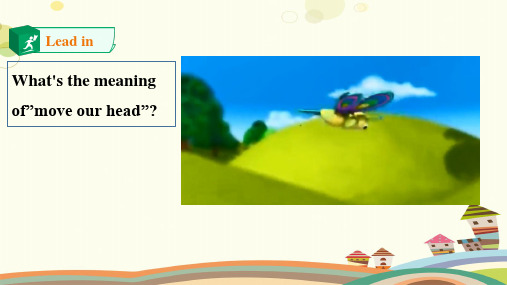
Presentation
1.housework[ˈhaʊswɜːk] n.家务劳动;家务事 不可数名词 do the housework做家务 I like doing the housework.我喜欢做家务。 改错:The houseworks make me tired. houseworks改为housework
Reading
1b Listen and write the activities next to the correct frequency
waolrwdas.ys (100%)
exercise read
usually
watch TV
often
help with homework
sometimes
Presentation
I could______control my feelings at the moment.The movie reminds me of my childhood. A.really B.nearly C.slowly D.hardly
Presentation
3.ever adv.在任何时候;曾经;从来 Have you ever been here? 你曾经来过这里吗? You can come here ever. 你随时可以来。
Presentation
Mary hardly knows about you,does she? 玛丽几乎不了解你,是吗? 辨析:hard与hardly hard,努力的,硬的,可做形容词或副词 hardly,副词,几乎不 He studies hard.他学习努力。 He studies hardly.他几乎不学习。
Lead in
人教版八年级英语上册 Unit2 课件
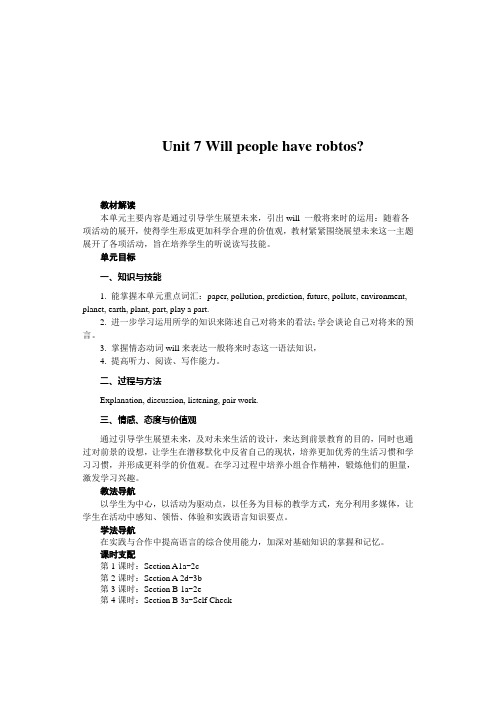
Unit 7 Will people have robtos?教材解读本单元主要内容是通过引导学生展望未来,引出will 一般将来时的运用:随着各项活动的展开,使得学生形成更加科学合理的价值观,教材紧紧围绕展望未来这一主题展开了各项活动,旨在培养学生的听说读写技能。
单元目标一、知识与技能1. 能掌握本单元重点词汇:paper, pollution, prediction, future, pollute, environment, planet, earth, plant, part, play a part.2. 进一步学习运用所学的知识来陈述自己对将来的看法;学会谈论自己对将来的预言。
3. 掌握情态动词will来表达一般将来时态这一语法知识,4. 提高听力、阅读、写作能力。
二、过程与方法Explanation, discussion, listening, pair work.三、情感、态度与价值观通过引导学生展望未来,及对未来生活的设计,来达到前景教育的目的,同时也通过对前景的设想,让学生在潜移默化中反省自己的现状,培养更加优秀的生活习惯和学习习惯,并形成更科学的价值观。
在学习过程中培养小组合作精神,锻炼他们的胆量,激发学习兴趣。
教法导航以学生为中心,以活动为驱动点,以任务为目标的教学方式,充分利用多媒体,让学生在活动中感知、领悟、体验和实践语言知识要点。
学法导航在实践与合作中提高语言的综合使用能力,加深对基础知识的掌握和记忆。
课时支配第1课时:Section A1a-2c第2课时:Section A 2d-3b第3课时:Section B 1a-2e第4课时:Section B 3a-Self Check人教版义务教育教科书◎英语八年级上册第1课时Section A 1a-2c教学目标一、知识与技能1. 能掌握以下单词:paper, pollution, prediction, future, pollute, environment, planet, earth, plant, part, play a part.2. 能掌握以下句型:What will the future be like?Cities will be more polluted. And there will be fewer trees.Will people use money in 100 years?Will there be world peace?Kids will study at home on computers.They won’t go to school.二、过程与方法采用目标和直观教学法,调动学生的积极性,引导他们积极参与课堂。
人教版八年级英语上册课件unit2Section_B

1d Listen again. Fill in the blanks in the survey.
Questions 1.How often do you exercise?
Tina Every day
Bill Hardly ever
2.How often do you eat fruit?
3.How many hours do you sleep every night?
2 a Rank these activities according to how often
you think your classmates do them (I=most often, 6=least often)
watch TV go to themovies play computergames exercise or play sports use the Internet go campingin thecountry
Complete the pie charts.
15
10
13
2
20
20
45
90
85
4 times a week
2c Read the article again and answer the questions.
1.How many students do not exercise at all? 20% students do not exercise at all.
Twenty percent exercise only one to three times a week. And twenty percent do not
exercise at all!
人教版八年级上册英语《Unit 2 Section A 2a-2d》优质PPT课件
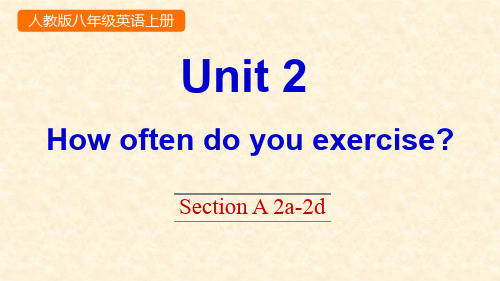
6. I have to play tennis with my friends.
我要和我的朋友一起打网球。
play tennis 打网球
当play表示演奏,后跟乐器时,乐器的前面要 加the。 play the piano 弹钢琴 play the violin 拉小提琴
本课时重点回顾
1. What do you usually do on weekends? I always exercise…
3. 他一个月去两次图书馆。 He goes to the library twice a month.
4.今天天怎么会这么蓝? How come the sky is so blue today?
5. 莉莉正在学习跳摇摆舞。 Lily is learning swing dance.
中考链接
e.g. Let’ s do our exercises. 让我们做练习吧。 Walking is a good exercise. 散步是很好的运动。
3. three times a week
times 表“次数” time and time again 千万次得 three or four times a week 一周三四次 表示一周/月/年多少次,可以用 ... times a week / month / year, 注意有两个词有单独的表示法,“一次”用“once”, “两次”用“twice”。
2. I visit my grandparents twice a year.
How often do you visit your grandparents?
III. 汉译英。
1. — 他多久去购一次物? — 个月一次。
人教版英语八年级上册Unit2 Grammar Focus-3C课件
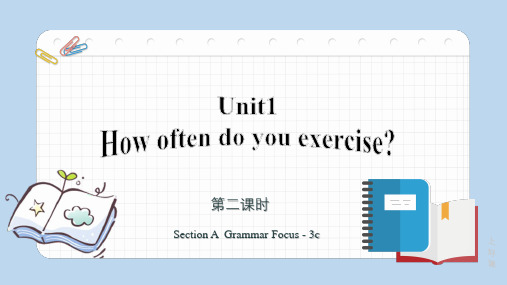
What do they do on weekends?
Then often help with housework.
What does she do on weekends?
She sometimes goes shopping.
How often do you go to the movies? I go to the movies maybe once a month.
频度副词 (Adverbs of Frequency)
位置: 放在实义动词前面。
Do you remember?
Eg: They hardly ever make dinner .
When we watch movies about the future, we sometimes see robots.
What do they do on weekends? What does she do on weekends? How often do you go to the movies? How often does he watchTV? Do you go shopping?
T为h第en 三oft人en称he单lp w数it时h h,ou则sew助or动k.词用
②询问活动频率的问句(How often…?)和使用单位时间内活动频率次数的表达方式的答语。
03 文化意识:
通过本课的学习,养成健康的生活方式和饮食习惯,进行合理的运动锻炼,以保持健康的体
魄。
04 思维品质:
通过本单元的学习,培养学生的逻辑表述能力,激发学生的积极思维,并使学生互相了解,
增进友谊,加强人际交往,以形成良好的人际关系。
Do you go shopping?
- 1、下载文档前请自行甄别文档内容的完整性,平台不提供额外的编辑、内容补充、找答案等附加服务。
- 2、"仅部分预览"的文档,不可在线预览部分如存在完整性等问题,可反馈申请退款(可完整预览的文档不适用该条件!)。
- 3、如文档侵犯您的权益,请联系客服反馈,我们会尽快为您处理(人工客服工作时间:9:00-18:30)。
1.你多长时间去看一次电影? How often do you go to the movies? 2.他的爷爷每天都做运动。 His grandpa exercises(dose exercises) every day. 3.我每周购物两次。 I shop(go shopping) twice a week. 4.我喜欢读书,我每天都读英语。 I like reading a book(reading books). I read English every day. 5.-周末你通常做什么?-上网。 -What do you usually do on weekends? -Use the Internet. 6.迈克周末几乎不看节目。 Mike hardly ever watches TV on weekends. 7.-I didn't do my homework yesterday evening. -为什么呢? How come? -因为我上摇摆舞课了。 Because I have a swing dance lesson.
Exercises :Fill in the blanks according to the Chinese meaning.
1.你多长时间去看一次电影? ___________do you __________? 2.他的爷爷每天都做运动。 His grandpa _______________. 3.我每周购物两次。 I _____________. 4.我喜欢读书,我每天都读英语。 I like _______. I read English every day. 5.-周末你通常做什么?-做运动。 What do you_____do________? -______________. 6..迈克周末几乎不看节目。 Mike _____watches_______ on weekends. 7.-I didn't _____________yesterday evening. -为什么呢?____________? -因为我上摇摆舞课了。______I____________.
Swing dance
2d
• The first step: Listen to the
tape and answer the following question.
• Why Claire is busy next week?
• Because she will have dance and piano lessons.
Weekend activities
What does he/she do on weekends?
How often does she dance after school?
always>usually>often>sometimes >hardly ever(几乎没有) >never every day She always dances after school.
Pair work: Make a survey about what activities you and your
friends do and how often you do them.
Activities watch TV use the Internet read English books go to the movies ...
Lucy
How often does she swim after school?
always>usually>often>sometimes >hardly ever(几乎没有) >never 5 times a week She usually swims after school.
Lily
How often does he play soccer after school?
An Interview
An Interview
• Reporter: So, Cheng Tao, how often do you watch TV ? • Cheng Tao: Hmm... about twice a week, I guess . • Reporter: Uh-huh. And how often do you read ? • Cheng Tao: Oh, I read every day at school ! • Reporter: How often do you go to the movies ? • Cheng Tao: Uh...l et me see... maybe once a month ? • Reporter: How often do you exercise ? • Cheng Tao: Oh, I exercise about three times a week . • Reporter: How often do you shop ? • Cheng Tao: Shop? I shop about ... about twice a month .
Check your answers.
Homework for today
Make an information card of your favorite person, then to share it with your classmates next class. The information card is about what his or her weekend activities are and how often he or she does these activities.
The second step:Language points
The third step:Listen again and read after the tape.
The fourth step:Role-play the conversation. One acts Jack and the other one acts Claire.
Bob
How often does he eat vegetables?
always>usually>often>sometimes >hardly ever(几乎没有) >never He never eats vegetables.
Rick
Cheng Tao is talking about how often he does some activities. Listen to the interview [‘ɪntəvju:] n.采访,面试and fill in the blanks. (听这篇采访,并且补全对话)
• Where is a will, there is the way.
I hardly ever
my friend twice a week
Make an interview
• Reporter: How often do you watch TV? • Tom: I watch TV twice a week. • Reporter:What’s your favorite program['prəʊɡræ m] ? • Tom:Animal World. • Reporter: How often does your friend watch TV? • Tom: She hardly ever watches TV . • Reporter:… • Tom:…
=Sometimes he eats junk food.
Mary
How often does he drink milk?
always>usually>often>sometimes >hardly ever(几乎没有) >never
He hardly ever drinks milk.
once a month =1 time a month
always>usually>often>sometimes >hardly ever(几乎没有) >never 4 times a week He often plays soccer after schoole eat junk food?
always>usually>often>sometimes >hardly ever(几乎没有) >never He sometimes eats junk food. twice a week =He eats junk food sometimes.=2 times a week
1.be full for 忙碌的 full adj. (1).满的,充满的 be full of eg:The bottle is full of water. (2).饱的 (反:hungry) I can't eat any more.I am quite full. 2.How come为什么呢,怎么会?(多用于口语,相当于 Why) eg:-How come Tom desn't come to the class? -Because he is ill. 3.have a lesson( have lessons )上课 have a______lesson(have ____lessons) 上......课 eg:(1) We have eight lessons a day. (2) We are having an English lesson now.
• Reporter: So, Cheng Tao, how often do you watch TV ? • ChengTao: Hmm... about ___________, I guess . • Reporter: Uh-huh. And how often do you read ? • Cheng Tao: Oh, I read __________ at school ! • Reporter: How often do you go to the movies ? • ChengTao: Uh...l et me see... maybe ___________? • Reporter: How often do you exercise ? • Cheng Tao: Oh, I exercise about _________________ . • Reporter: How often do you shop ? • Cheng Tao: Shop? Shop? I shop about ... about twice a month . • .
